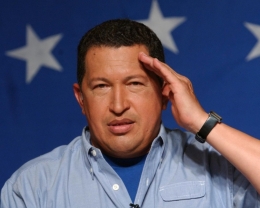The political future of Venezuela will be decided shortly following the recent passing of President Hugo Chávez at the age of 58.
Chávez reportedly died from a heart attack following a long battle with cancer on 5 March in the capital Caracas.
His passing represents the end of an era for a divided country. The late president served as his nation’s leader since 1999, developing an iconic if controversial status around the world for policies curbing press and political freedoms, while at the same time instituting social programmes that lifted countless numbers out of poverty.
An outpouring of support has emerged for the late Chávez, as Venezuelans filled the streets to mourn the death of their president. The government declared seven days of mourning around the country, while Venezuelan flags around the globe are being flown at half-mast.
Following Chávez’ previously stated wishes, Venezuelan vice president Nicolas Maduro will serve as interim president until general elections take place at some point before 4 April. Maduro is being pegged as candidate for Chávez’s United Socialist Party.
Though it is unclear who will represent Maduro’s opposition, the current vice president is widely considered the favourite to win the election.
Via his teary-eyed announcement of Chávez’ passing, Maduro urged the Venezuelan people to forget their differences in favour of respect and unity. “We must unite now more than ever,” he said.
As Venezuela enters the post-Chávez era, others shared sentiments similar to Maduro’s. Former presidential candidate Henrique Capriles Radonski said: “This is not the time for difference. It is the time for unity. It is the time for peace.”
Maduro also stands by the conspiracy theory held by Chávez that the United States government infected the late president with his disease.
“We have no doubt that commander Chávez was attacked with this illness,” Maduro said, “The old enemies of our fatherland looked for a way to harm his health.”
The negative attitude toward the US suggests that many of Maduro’s political stances will reflect those of Chávez. Despite these potential parallels, there seems to be hope that Venezuela will come together as a unified country more so than in recent years.












